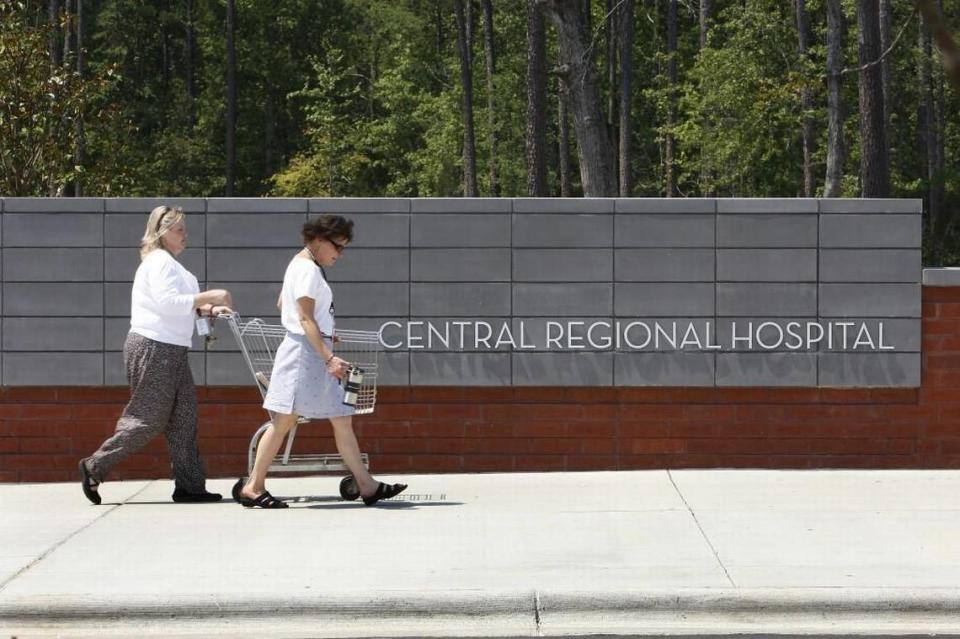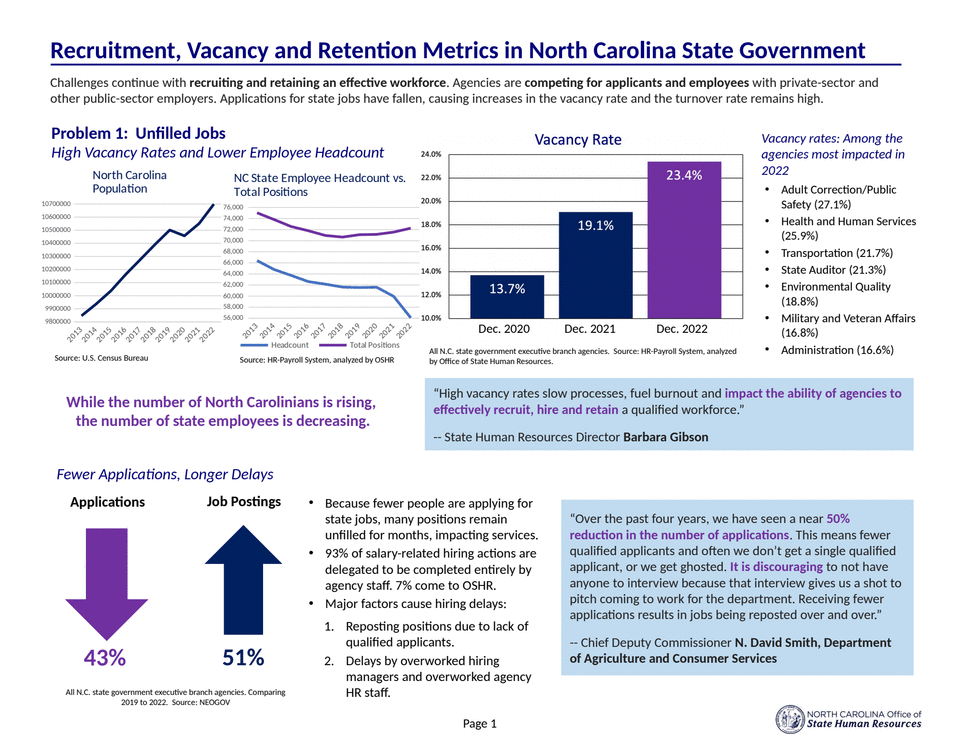NC Senate budget comes out Monday. Will raises be enough to fix the state worker shortage?
There’s a growing vacancy rate for North Carolina state employees, and the level of raises in the state Senate’s upcoming budget proposal could make it better or worse.
The Senate budget will be out on Monday, and likely voted out of that chamber by the end of next week.
With staffing shortages in some jobs worse than others, the House’s budget bill passed in April includes more significant raises than in recent years. Higher raises were slated for harder-to-fill jobs, like in health care and public safety. Historically, the Senate proposes lower increases than the House, and the final, compromise budget ends up somewhere in-between.
Their decisions will affect workers like Tracey Heffren, a registered nurse at Central Regional Hospital in Butner, a state-run mental health facility that has faced shortages and staff burnout for more than a year.
In an interview with The News & Observer this week, Heffren said the nursing shortage there is “problematic.” She was a floor nurse, working directly with patients, before moving last year to a different department where she screens new employees coming on board.
“I’m not seeing any new, full-time nurses coming into the building,” she said. Instead she sees agency staff, known as travelers, who are contract nurses hired to handle the staffing shortages. They are paid better, but are not state employees who work there regularly like Heffren, who lives in nearby Creedmoor.
Heffren said her floor-nurse unit for eight years, until the COVID-19 pandemic, had four full-time day-shift nurses.
“Now there are zero. Now they are all agency nurses. That varies unit to unit, across shifts, across units,” she said. What doesn’t vary, she said, is that regular, full-time state employee nurses’ salaries are lower than those of traveling nurses. Beyond money, more flexibility with lengths of shifts and solving some issues with middle management would help recruit and retain more employees, she said. One reason she and others stay, she said, are state employee benefits.
Working in mental health
The kind of work nurses do in mental health facilities is a stressful job, Heffren said. Some patients come to Central Regional Hospital from jails and prisons and can be violent.
As gun violence gets worse, she said, the issue of mental health gets worse.
Many people talk about mental health as a solution to mass shootings and gun violence, she said, and that would require fully staffed facilities with full-time state employees.
“When someone’s in crisis, they go to the emergency room, then wait for a bed (at Central Regional Hospital). More staffing means more beds,” she said.
“A lot of people say money’s not always the answer, but it is a big chunk of it,” she said.
Psychiatric care is a unique field, she said, because rather than black-and-white medical solutions, “psych is shades of grey. I’s all a little different and it’s challenging.”
Heffren said she enjoyed seeing patients come to Central Regional and receive the right medications and care.
“People like seeing that, like helping and seeing these people turn themselves around and function in society,” she said.

State report on job vacancies, turnover
A March report from the Office of State Human Resources says there are continuing challenges “with recruiting and retaining an effective workforce.”
“Agencies are competing for applicants and employees with private-sector and other public-sector employers,” the report says. “Applications for state jobs have fallen, causing increases in the vacancy rate and the turnover rate remains high.”
The report breaks down the highest vacancy rates:
▪ Department of Adult Correction/Public Safety: 27.1%
▪ Department of Health and Human Services: 25.9%
▪ Department of Transportation: 21.7%
▪ Office of the State Auditor: 21.3%
▪ Department of Environmental Quality: 18.8%
▪ Department of Military and Veteran Affairs: 16.8%
▪ Department of Administration: 16.6%
Page 2 of 2023_03_13v2-Recruitment Vacancy and Retention Metrics in North Carolina State Government80

Contributed to DocumentCloud by Dawn Vaughan (The News and Observer) • View document or read text
State Human Resources Director Barbara Gibson said in the report that the high vacancy rates “slow processes, fuel burnout and impact the ability of agencies to effectively recruit, hire and retain a qualified workforce.”
The number of applications has dropped nearly 50% over the past four years, Agriculture Chief Deputy Commissioner N. David Smith said in the same report.
“This means fewer qualified applicants and often we don’t get a single qualified applicant, or we get ghosted. It is discouraging to not have anyone to interview because that interview gives us a shot to pitch coming to work for the department. Receiving fewer applications results in jobs being reposted over and over,” Smith said.
This echoes the problem Smith described about a year ago to The N&O. In addition to a decline in applicants, he said in 2022, newer workers don’t stay for their entire careers anymore, he’s noticed. For them, “state employment is not a desired place to be anymore.”
The 2023 OSHR report reflects that. Turnover is highest in the first year someone is a state employee.
In 2022, the highest turnover rate was at DHHS with 49%, followed by Adult Correction/Public Safety, State Human Resources and the Department of Insurance.
Shortages in state hospitals, other agencies
Dr. Rakesh Patel, a physician at Central Regional Hospital and president of the UE Local 150 union of public sector employees, said the staffing shortages are a significant problem that could be alleviated by action from state lawmakers. Patel also emphasized the impact to patients, and potential patients, during a visit to the General Assembly last week, when he spoke at a news conference with the left-leaning NC Budget & Tax Center.
Patel listed off the state’s psychiatric hospitals, developmental delays centers and treatment centers across the state.
“I can’t think of a set of folks in our state that are as vulnerable as these folks, and we worry about what the future of the care for these folks will be. About a month ago, the alcohol and drugs treatment center in Butner closed down,” Patel said. With the vacancy rate in DHHS and turnover as well, Patel said that “working for the state is not an attractive option for many folks. We are worried about the future pipeline of folks that work in these hospitals.”
Patel told The N&O in an interview that increasing staff shortages could lead to more wards being closed down.
“There’s no way we can keep up with folks leaving,” he said. “The bill is going to come due.”
He said those DHHS employees should receive a 20% raise and minimum wage for hourly workers should rise to $20 an hour.
He worries about the pipeline of the next generation of state employees, he said, given turnover among newer staff.
“How do you suppose we run a hospital without nurses?”

The vacancy and turnover issue is nonpartisan, across agencies. State Labor Commissioner Josh Dobson, a Republican, is quoted in the OSHR report about his agency’s 25% vacancy rate for jobs in compliance.
“To add positions and recruit new compliance officers, we have to provide a more competitive salary,” Dobson said.
In March, Agriculture Commissioner Steve Troxler, a Republican, told state lawmakers that the staffing shortages are problematic.
“We need to attract good people, and we need to keep good people,” Troxler said. ”It’s about salary. There’s no other reason but salary.”
What the raises might be
Heffren said for nurses and other DHHS workers in state-run mental health facilities, a 20% increase in the budget would make a big difference in recruitment and retention.
Democratic Gov. Roy Cooper has proposed 8% across-the-board raises for state employees over two years. The House budget, passed in April, called for 7.5% raises for most state employees over two years, with an additional 2% for the hardest-to-fill jobs.
Ardis Watkins, executive director of the State Employees Association of North Carolina, balked at the House’s raises proposal.
“The General Assembly will have to do much better than this to convince employees that they care about the understaffing crisis plaguing state government,” Watkins said.
Senate leader Phil Berger, an Eden Republican, told reporters last week that Republican senators were still working on the amount of raises they’ll propose in the forthcoming budget.
Both chambers have been on a break from floor votes this week.
“I don’t think there’s any question that, as you’ve heard me say before, there are a number of reasons that exist for vacancies in various departments. Some of it probably has to do with with salaries, and we will make an effort to try to address some of those challenges that are out there,” Berger said.
Once the Senate passes its budget, the Senate and House will negotiate a final budget to send to Cooper.

